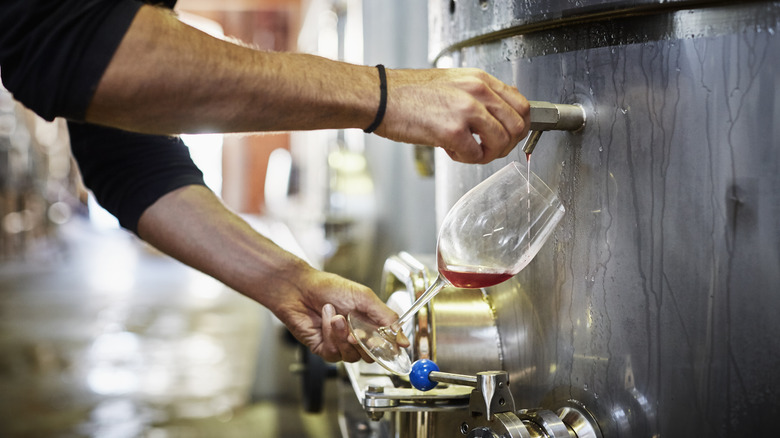The Myth You Should Stop Believing About Sulfite-Free Wine
Sulfites sometimes get a bad rap in the public perception of wine, having long been blamed for headaches and adverse reactions. The truth is that all wines — even those labeled "sulfite-free" — contain at least trace amounts of sulfites from the fermentation process, and they are not always responsible for the negative effects one might feel after indulging. While some people are indeed allergic to sulfites, for most wine drinkers, they are a non-issue. Sulfites have been an integral part of winemaking since the 19th century, and play an important role in producing high-quality wine. Dismissing this wine myth can help you better understand what goes into your glass.
Sulfites are chemical compounds that act as preservatives in food and drink. In wine, the most common sulfite used is sulfur dioxide (SO2). Sulfites protect against oxidation, a process that spoils wine and ruins its color and smell. They also serve to prevent unwanted bacterial growth while promoting the growth of beneficial yeast for fermentation. Some sulfites are produced naturally by the yeast, but sometimes winemakers need to add some extra sulfur dioxide to maintain balance. There are many common additives involved in the winemaking process that casual drinkers may not be aware of, some of which are the reason why many wines are not actually considered vegan. Another reason it always pays to learn more about what you consume and how it's made.
Who needs to worry about sulfites?
For the majority of people, sulfites are a non-issue when consumed. As they are a natural byproduct of fermentation, they can occur in foods like kimchi and sauerkraut, as well as in some vegetables such as asparagus, leeks, and onions, and most people have no problem digesting them. However, about one in every hundred people is sensitive to sulfites, triggering anaphylactic reactions like hives and swelling. Those with certain respiratory issues, such as sulfite-sensitive asthma, can also experience negative side effects. About 5% of those who suffer from asthma are sensitive to sulfites. Some people also lack the enzyme needed to break down sulfites in their digestive tract, which can lead to adverse reactions.
But even in those with sulfite sensitivity, sulfites may not be to blame for the dreaded wine headaches, as studies have found that sulfite-free wines cause complaints with the same frequency. The same people who experience wine headaches may also be able to eat sulfite-rich foods without issue. In fact, there are many baked goods that contain more sulfites than most wines. That's not to say that sulfites do not indeed cause problems for some people, and there are some low-sulfite wines available for those who prefer them. But for the most part, sulfites are likely not to blame for your aching head after a glass of red.
What's really to blame for wine headaches?
So if sulfites aren't to blame, what is? There are a few potential culprits, not least of which is the alcohol itself. Alcohol is a diuretic, meaning it can dehydrate you and quickly cause aches if you aren't mindful of your water consumption. Histamines are also a potential reason behind wine headaches, as they can dilate blood vessels, leading to an achy brain. Histamines occur naturally in the skin of wine grapes, and are most prevalent in red wines since the skins are more involved in the production process compared to white or sparkling wines. Tyramine is another naturally occurring compound in wine that constricts and dilates blood vessels, sometimes increasing blood pressure and potentially causing discomfort.
Tannins, important for giving wines a pleasant texture, structure, and mouthfeel, can also lead to headaches. Tannins cause the brain to release serotonin, which for some people can create discomfort if levels are too high. But tannins are also present in other common treats like dark chocolate and tea, so don't be too hasty to point a finger. There may not be one definitive reason behind wine headaches for everyone, so it's important to listen to your body while you drink. Some doctors advise taking an antihistamine before indulging if you're sensitive, and it's generally good practice to drink some water before and between each glass of wine. Do what works for you, and enjoy your wine, sulfites and all.



